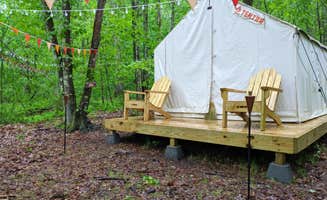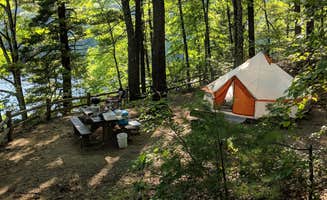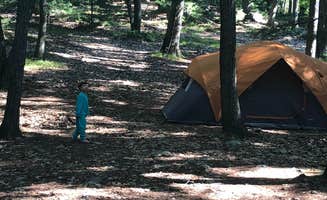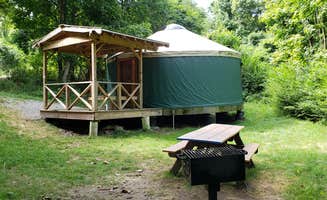Tent campers near Auburn, Massachusetts can access sites within an hour's drive that offer varied terrain and woodland settings. The region experiences warm summers and cold winters with peak camping season running May through September when temperatures average 65-80°F. Sites tend to be more rustic with most requiring some preparation for wilderness conditions rather than offering resort-style amenities.
What to do
Explore waterfront activities: At Tully Lake Recreation Area, campers can rent canoes, kayaks, and paddleboards to navigate the lake. "We take our canoe and spend the whole day at the lake. You can find lots of private areas to swim, pick blueberries and relax," noted one visitor. The lake offers multiple islands and coves to discover during a day of paddling.
Visit historic sites: The Boston Harbor Islands State Park offers unique exploration opportunities beyond typical camping. "Exploring the island was awesome. We found all kinds of bunkers and a brick house," shared one camper. The islands contain former military installations, lighthouses, and historical structures accessible by trail.
Hiking opportunities: Multiple campgrounds connect to trail systems with varied difficulty levels. At Tully Lake, visitors can access Doane's Falls, while one camper at Federated Women's Club State Forest noted, "If you continue past site 15, you'll head through Gate 36 out toward Soapstone Hill which offers a great view of Quabbin Reservoir and sunsets." Many locations offer geocaching opportunities that combine hiking with treasure hunting.
What campers like
Island camping solitude: The most remote tent camping options near Auburn include island sites. "We stayed on the island site, which was absolutely amazing. The views are to die for," reported one Tully Lake camper. At Boston Harbor Islands, after day visitors leave, tent campers have the islands largely to themselves with city skyline views.
Car-free camping environments: Many sites at Barton Cove Campground and Tully Lake restrict vehicles at campsites. "No cars at all at the campsites, which was great for peace of mind as our toddler roamed around. It also made for a super quiet stay," explained a camper. This creates a more peaceful environment without engine noise or headlights.
Swimming access: Natural water features provide swimming opportunities at many locations. "The water is clean and fine for swimming with a few areas that make for easy entry into the water (including the 'beach')," noted a visitor to Buck Hill Campground. Most waterfront sites allow swimming directly from campsites rather than requiring visits to designated swimming areas.
What you should know
Reservation timing: The best tent camping near Auburn, Massachusetts requires advance planning. "The sites fill up weeks out (and can completely fill the day registration opens, which is date-dependent each year...Booking for Memorial Day meant I booked in April)," explained a Tully Lake camper. Premium waterfront sites often book immediately when reservation systems open.
Water access considerations: Many primitive sites lack running water. "Bring your own water. There is a composting toilet located near the group site in the field," advised one camper at Federated Women's Club State Forest. Some campgrounds have central water spigots requiring containers for transport to sites.
Cell service limitations: Many woodland camping areas have limited connectivity. A visitor to Federated Women's Club State Forest warned, "Cell phone coverage is faint to nonexistent on Verizon. You may want to download offline maps before you head out here." Plan accordingly with offline maps and emergency contact plans.
Tips for camping with families
Consider site proximity to facilities: When camping with children, bathroom access becomes important. At Tully Lake, one family noted, "Our site was fairly far from services, long run with small kids in the middle of the night. Not our favorite place, but to be fair mostly based on our site." Research site maps before booking to understand distances.
Prepare for gear transportation: Many tent sites require carrying equipment from parking areas. A family visiting Camp Nihan Education Center appreciated that "The group site is super close to parking and yet the terrain is rugged enough that it always felt like we were really in the woods." Bring collapsible wagons or backpacks for easier transport.
Look for kid-friendly water access: Shallow water areas provide safer swimming for children. Camp Nihan visitors mentioned, "The camp is also adjacent to Breakheart Reservation, which had a great shallow pond with life guard on duty as well as bike trails and a range of different hikes." Water safety equipment remains essential at all locations.
Tips from RVers
Size restrictions apply: Most tent-focused campgrounds near Auburn cannot accommodate large RVs. At Sodom Mountain Campground, while technically big-rig friendly, visitors note conditions can be challenging. "All roads are dirt and all potholes have been repaired," mentioned one camper, indicating previous access issues.
Separate camping sections: When RVs are permitted, tent campers often have designated areas away from motorized vehicles. At Barton Cove, tent platforms keep campers separate from RV areas and provide better views. This separation creates different camping experiences within the same property.
Limited hookups: Most camping areas near Auburn focus on tent camping with minimal or no RV hookups. Many locations that do accept RVs require self-containment with no electricity, water, or sewer connections, making them suitable only for experienced boondockers with solar setups or generator restrictions.





